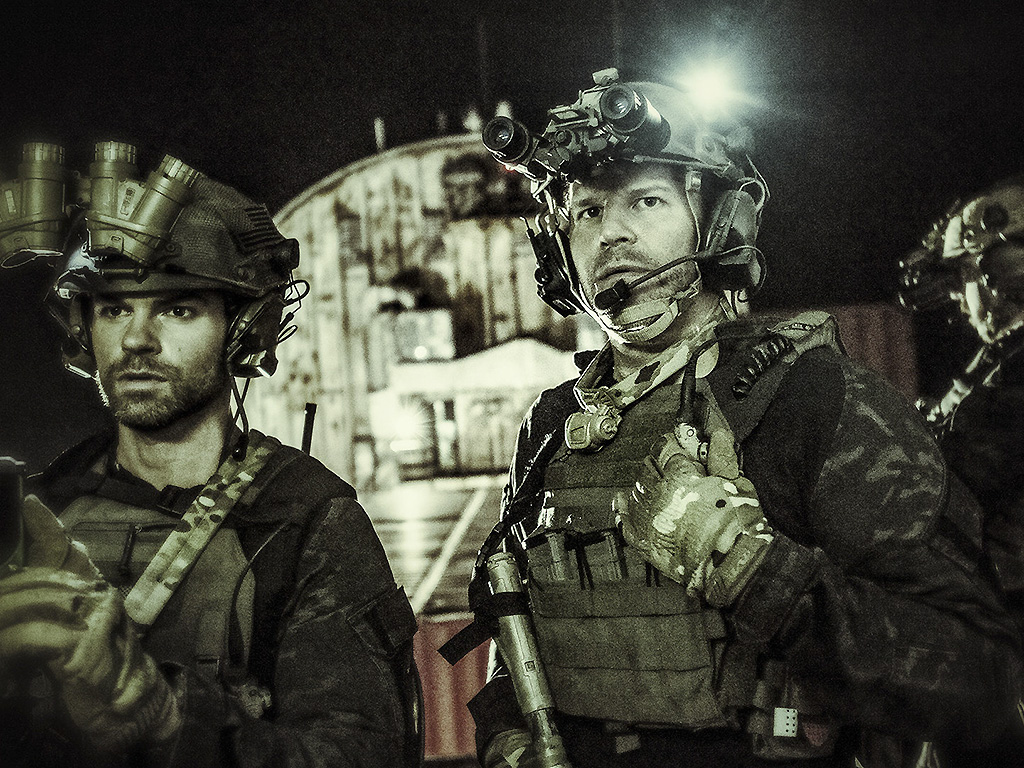David Boreanaz is back on TV in SEAL Team, playing troubled-yet-gifted Navy SEAL Jason Hayes. Boreanaz barely took a break from playing a leading-man role on primetime TV, with Bones ending in March 2017 after 12 seasons.

SEAL Team follows the professional and personal lives of the most elite unit of Navy SEALs as they train, plan and execute the most dangerous high-stakes missions, and Hayes is Tier One’s leader. At his side is agency officer Mandy, played by Jessica Paré (Mad Men), who often tries to be the voice of reason if the ethics or mission goal become muddy, and Neil Brown Jr. (Insecure, The Walking Dead) as Hayes’ trusted Navy SEAL pal, Ray.
READ MORE: 6 things to know about ‘Law & Order True Crime: The Menendez Murders’
But it’s not military missions of the week (though they will receive new orders and initiatives in each episode) — SEAL Team deals with strife both afield and at home, where the soldiers’ families wait with bated breath. With ample use of night vision, gunfire and realistic-looking sets, the show is setting a standard for all of the other military-based shows coming out this fall.
Global News caught up with the cast of the show at the summer session of the Television Critics Association. Here are 5 things to know about SEAL Team.
Family matters
- Martin Short’s family ‘devastated’ by death of daughter, Katherine, at 42
- David Bowie’s daughter says she missed dad’s death when forced into rehab centre
- Robert Carradine, ‘Lizzie McGuire’ and ‘Revenge of the Nerds’ actor, dead at 71
- ‘Home Improvement’ star Zachery Ty Bryan jailed after 6th arrest in 5 years
As with any military service member, family is key. Not only are they at home cheering for you (hopefully), but they’re there with open arms and ears when the mission is complete. Crucial to anyone’s survival, the support of a loving spouse and/or kids can provide enough motivation to even the most damaged soldier.
Hayes has to deal with a fallen comrade, Nate, who we slowly learn about as Season 1 progresses. Hayes believes that he’s responsible for Nate’s death, and carries a lot of guilt with him. On top of that, he tries his best to help Nate’s bereft family as well as his own two children and his very dissatisfied, separated wife, Alana (Michaela McManus).
There will be dogs
A fun element of SEAL Team, one that hasn’t really been explored before on a military show, is the inclusion of dogs. Used frequently by teams on missions, the dogs sniff out targets and explosives and are an integral part of the group. They even attack when necessary.
SEAL Team Six, which brought down notorious terrorist Osama bin Laden, had a dog named Cairo on their team.
READ MORE: Liz Dawn dead: Vera of ‘Coronation Street’ dies at 77

Get breaking National news
Cerberus, the dog of the Tier One team, is all business. (Her real-life name is Dita the Hair Missile Dog, and she has her own Instagram account.) On-set, the dog never left his trainer’s side and is one of the lithest, most fit dogs to ever star on TV. Interestingly, military dogs can run twice as fast as a fit human, so there you go. All we can hope is that Cerberus doesn’t die because we don’t need any more added drama to this intense show.
SEAL Team is more of a personal drama than a military show
While it looks like a military show and certainly sounds like one, SEAL Team has more going on in the background. Namely, the trajectory of the team and how it impacts their personal lives — and how that, in turn, affects their team’s performance on missions.
“We’re well aware of the work that Tier One operators do,” said executive producer Ed Redlich. “They go to other places and are in the heart of arresting people of a certain colour and we don’t want to be telling those stories; we don’t want to be a chest-pumping show.”
To put it simply, SEAL Team wants to be known as a character-driven drama.
READ MORE: ‘The Brave’ TV show: Mike Vogel and team foray into world of undercover special ops
Two other executive producers agree that the focus on characters and their lives is tantamount to the show’s success.
“I don’t think our show is about the military,” Benjamin Cavell, executive producer, said. “I think it’s about the people who do the work, rather than about the work itself.”
“It’s not politic. It’s human study. That’s what we’re trying to do with a big backdrop,” added executive producer Christopher Chulack.
This show isn’t necessarily for Americans only
Paré says SEAL Team is universal, and you don’t have to be American to get on-board. As one of the only Canadians in the cast and crew, Paré thought she’d have a harder time coming to terms with the content of the show. Instead, what she found was that it was relevant to her life and rather than look at it like Americans out to save the world, they’re a team of individuals, regardless of background, working towards the greater good.
“Yes, it’s a show about Navy SEALs, and I don’t think you would find many shows with that backdrop that don’t have an American flag in it,” said Paré. “I don’t think you would find many shows at all that were anti‑American. What the writers are looking at, what we all try to look at is that it’s a nonpartisan group. They go out and fight for our freedom, for our safety sitting here together right now, in ways that I’ve never thought about. These non‑state forces for chaos are not going anywhere, and it’s irresponsible for that not to be a discussion.”
While SEAL Team might look jingoistic (yes, its logo even features the American flag), the show tries to illustrate how cautious the military is about casually entering warfare. They have more at stake than the political figures, away from the battlefield, who seek to blindly enter combat. The image of military people being irrational warmongers is vastly untrue, claims the show’s production team. SEAL Team isn’t about politics either, they attest.
READ MORE: ‘Jeopardy!’ contestants botch football question in game show fail
“It’s not about the politics, it’s a human study,” said Chulack.
“The things they do transcend politics… they don’t look at the results of elections,” agreed Cavell. “The work they do — it doesn’t matter who’s in the White House.”
“People who put their lives on the line and fulfill the duty when they may not even agree with a goal — there’s an opportunity to look at all that,” said executive producer Sarah Timberman. “We’re going to reflect the geopolitical reality of the world we live in.”
This is about as legit military as you can get
Hayes suffers from PTSD, causing him to touch his leg and make a fist with his hand on occasion. Boreanaz deliberately added on this side effect to drive home the impact of combat on SEALs’ psychiatric health. Aside from these tics, Hayes clearly suffers flashbacks and gap-outs, which, over the season, may directly hinder his performance on missions.
SEAL Team Episode 1 features Hayes’ session with a psychotherapist, Dr. Julie Kruger (Reiko Aylesworth), though it’s unclear if she’ll be there throughout the next several episodes. Regardless, in a society that often discards its vets, it’s nice to see the mental-health side of things getting some attention for once.
The drama also boasts several technical advisers who formerly served in Tier One, just like the main characters on the show. You can’t get more real than that.
‘SEAL Team’ premieres on Wed., Sept. 27 at 9 p.m. ET/PT on Global.













Comments
Want to discuss? Please read our Commenting Policy first.